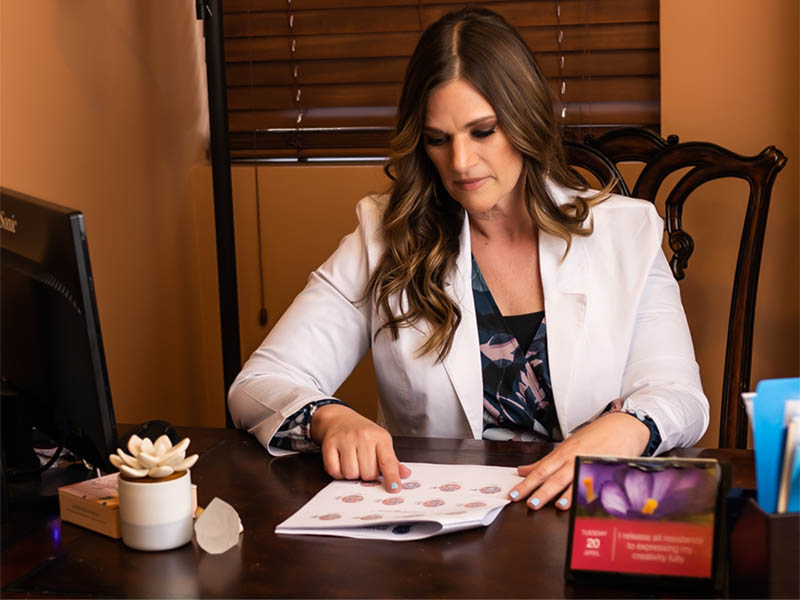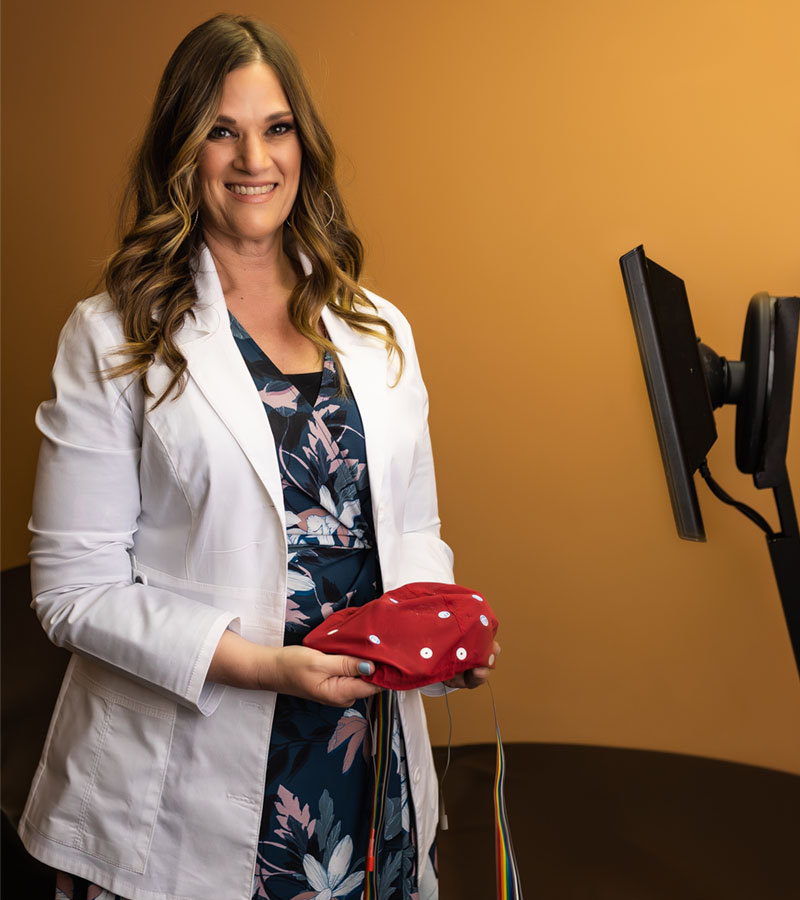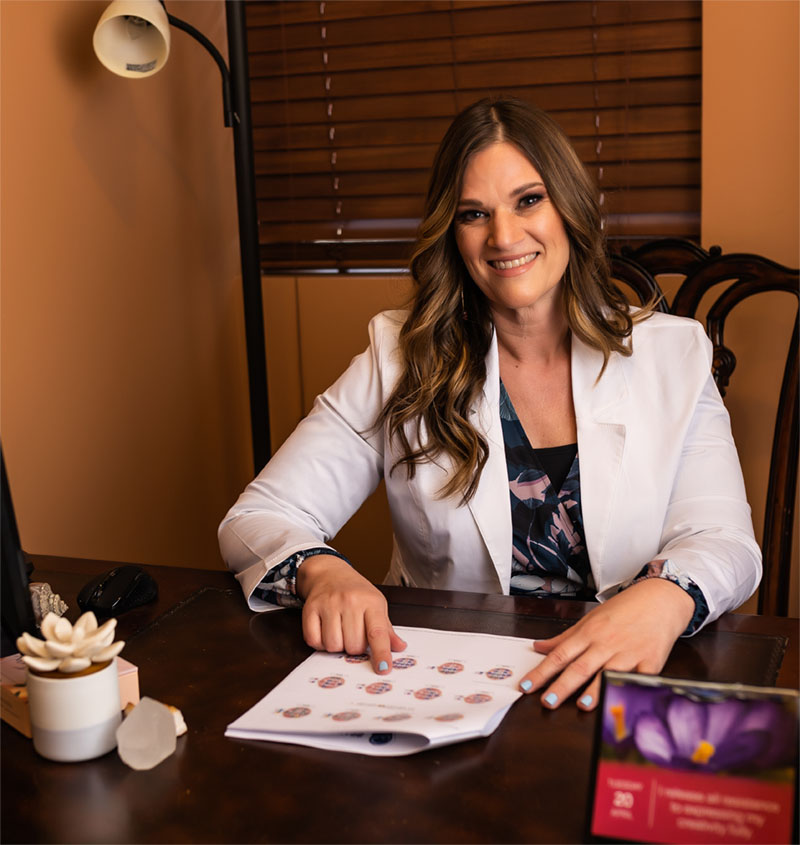Neurofeedback Therapy for ADHD
Unlock Your Brain’s Potential with Neurofeedback Therapy in Smithtown NY





Neurofeedback is a cutting-edge technique that has shown great promise in helping individuals with ADHD. By using advanced technology, neurofeedback allows individuals to train their brains to self-regulate and improve their attention, focus, and impulse control.



Neurofeedback Therapy for ADHD on Long Island
Neurofeedback offers a unique and effective approach to managing ADHD symptoms. Its non-invasive nature, long-lasting effects, personalized treatment, and compatibility with other therapies make it a valuable tool in improving attention, focus, and self-control for individuals with ADHD.
Non-Invasive ADHD Treatment without Medications
One of the key benefits of neurofeedback for ADHD is its non-invasive nature. Unlike medication, which can have side effects, neurofeedback is a safe and natural approach that does not involve any medications. This makes it a great option for individuals who are looking for ADHD treatment without medication or who have not found success with traditional treatments.
Long-term Effects of Neurofeedback Therapy for ADHD
Another benefit of neurofeedback is its long-lasting effects. Through repeated sessions, individuals can learn to rewire their brains and develop new neural pathways that support better attention and self-control. This means that the benefits of neurofeedback can extend beyond the treatment period, leading to lasting improvements in daily life.
Safe ADHD Treatment for Children, Teenagers and Adults
Neurofeedback therapy is considered safe for individuals across all age groups, including children, teenagers, and adults, due to its non-invasive nature and lack of pharmacological intervention. It involves the use of sensors placed on the scalp to monitor brainwave activity without any physical intrusion or use of medication, thereby eliminating risks associated with drug side effects. This aspect of neurofeedback makes it particularly appealing for children and adolescents, whose developing brains can be more sensitive to pharmaceutical treatments.
Enhanced Focus and Academic Performance in ADHD Through Neurofeedback
Neurofeedback therapy provides a groundbreaking solution for ADHD, notably in improving focus, learning, and academic performance. This non-invasive method trains the brain to control its activity, enhancing attention—a key challenge in ADHD. Patients learning to regulate their brainwaves see marked improvements in concentration and educational outcomes. This tailored approach not only eases ADHD symptoms but also equips individuals with self-regulation skills, boosting their confidence and capability in both academic and everyday life.
Personalized Sessions Tailored Your Type of ADHD
Neurofeedback is a highly personalized treatment. Each session is tailored to the individual’s specific brain patterns and their type of ADHD. By monitoring brain activity in real-time, neurofeedback can provide immediate feedback and rewards when the brain is functioning optimally. This helps individuals learn to recognize and replicate these patterns outside of the treatment sessions.
Neurofeedback Therapy is an Excellent Complementary ADHD Treatment Option
Neurofeedback is a versatile treatment that can be used in conjunction with other therapies. It can complement traditional ADHD treatments, such as medication or behavioral therapy, to enhance their effectiveness. This integrative approach allows for a more comprehensive and holistic treatment plan.
What is Neurofeedback Therapy?
Neurofeedback therapy, known as EEG biofeedback, is a revolutionary and non-invasive approach that empowers individuals to enhance their mental health and cognitive performance. This cutting-edge therapy utilizes electroencephalography (EEG) to provide real-time monitoring of brain waves.
The therapy is interactive and engaging, often involving visual and audio feedback that responds to the patient’s brain activity. It involves placing sensors on the scalp to measure electrical activity in the brain and then providing feedback to the individual about their brain activity in the form of visual or auditory signals. As patients learn to regulate their brain waves, they can actively work towards alleviating symptoms of their conditions or improving aspects like focus, relaxation, and stress management. Neurofeedback therapy has shown remarkable results in treating a wide array of conditions, including ADHD, anxiety, depression, and insomnia. It’s also widely used for enhancing overall mental wellness, reducing stress, and boosting cognitive functions, making it a promising option for those seeking to improve their mental health and quality of life.
The Science Behind Neurofeedback
The science behind neurofeedback, specifically BrainCore neurofeedback, is rooted in understanding and manipulating the brain’s natural range of wave patterns. The brain operates on various wave states throughout the day, aligning with our levels of activity, from deep sleep to high arousal. In a healthy brain, these states shift continuously. However, factors such as physical, emotional, chemical, or genetic stress can disrupt this natural rhythm. This disruption can lead to the brain getting “stuck” in a particular state, potentially triggering neurological symptoms associated with conditions like ADHD, anxiety, insomnia, depression, and other brain-based disorders.
Neurofeedback therapy, including BrainCore, addresses these “dysregulated” brain-wave patterns using a non-drug, operant conditioning approach. This method involves training the brain to modify its wave patterns, thereby alleviating the associated neurological symptoms. It works by providing real-time feedback to the patient, allowing them to consciously influence their brain activity. This process fosters the creation of new neural pathways and helps the brain to adapt to more optimal functioning states. Over time, these changes can become ingrained, leading to long-lasting improvements not only in the symptoms of neurological disorders but also in areas such as academic performance, sports, and business efficiency. The efficacy of this advanced technology is supported by various studies and is increasingly recognized as a potent tool for the treatment of conditions like ADHD and anxiety as well as performance enhancement.
How Does Braincore Neurofeedback Therapy Work for ADHD?
Neurofeedback therapy for ADHD (Attention Deficit Hyperactivity Disorder) operates on the principle of training the brain to enhance focus, attention, and self-regulation. ADHD is often characterized by irregularities in brain wave patterns, particularly in the areas responsible for attention and impulse control.

Assessment and Baseline Measurement
The therapy typically begins with an assessment, which includes a QEEG (quantitative electroencephalogram) to map brain wave activity and identify specific patterns associated with ADHD. This assessment establishes a baseline against which progress can be measured and helps us determine whether neurofeedback therapy will be helpful in your case. If your dysregulation patterns match the symptoms you wish to see improved then neurofeedback can be a viable option. If there is no evidence of dysregulation then neurofeedback would not be an option for you.

What to Expect During a Neurofeedback Session
ADHD is often linked to an imbalance between different types of brain waves, like theta (associated with daydreaming) and beta waves (associated with focused, attentive activity). Neurofeedback therapy sessions will be designed to target your specific dysregulation pattern as identified by the QEEG (brain map.)
During neurofeedback sessions, individuals with ADHD are connected to an EEG device that monitors their brain activity. The patient will watch a movie and if they are producing the desired brainwave then the screen will be bright and the sound will be optimized. If they are producing the maladaptive pattern the movie will decrease in brightness and the volume will be lower. The brain learns to modify itself to produce the proper brainwave pattern.
By receiving immediate feedback, the individual learns to consciously control and regulate their brain wave patterns. This process is based on operant conditioning; desirable brain activity is rewarded (e.g., the game progresses), reinforcing focused brain states.

Consistency that Leads to ADHD Symptoms Improvement
Neurofeedback therapy requires multiple sessions over time for effective results. Each session builds upon the last, to gradually train the brain to maintain attention and focus more effectively. Over time, these changes in brain wave patterns can lead to improved attention, reduced impulsivity, and better overall cognitive function in individuals with ADHD. The goal is for these changes to become sustainable, reducing the symptoms of ADHD even outside of therapy sessions.
Neurofeedback Studies for ADHD
- Neurofeedback as a Treatment Intervention in ADHD: Current Evidence and Practice (2019.)
This review discusses the limitations of traditional ADHD treatments and explores the efficacy of neurofeedback in regulating brain functions in ADHD patients. It highlights three standard neurofeedback training protocols: theta/beta (TBR), sensory-motor rhythm (SMR), and slow cortical potential (SCP), which have been shown to be efficacious and specific in treating ADHD. The review underscores the need for standard training for practitioners and binding standards for clinical practice. - The effects of stimulant therapy, EEG biofeedback, and parenting style on the primary symptoms of attention-deficit/hyperactivity disorder (2002.)
In a study involving 100 ADHD-diagnosed children aged 6-19, EEG biofeedback (neurofeedback) therapy, combined with Ritalin and parenting counseling, showed significant improvements in ADHD symptoms. Crucially, only children receiving neurofeedback sustained these improvements without Ritalin, as indicated by TOVA and ADDES scores and QEEG-Scan results. The study highlights neurofeedback’s effectiveness in providing lasting ADHD symptom relief, beyond the scope of pharmacological treatments. - A randomized controlled trial into the effects of neurofeedback, methylphenidate, and physical activity on EEG power spectra in children with ADHD (2016.)
In a multicentre randomized controlled trial involving 112 ADHD-diagnosed children (7-13 years old), the study compared neurofeedback (NF) with methylphenidate (MPH) treatment and physical activity (PA) as a control. The NF group underwent 30 sessions of theta/beta training over 10 weeks. Results showed that both NF and MPH significantly reduced theta power during rest compared to PA, with NF’s theta reduction linked to decreased ADHD symptoms. - Efficacy of Neurofeedback Treatment in ADHD: A Meta-Analysis (2009.)
This meta-analysis, which includes studies from as early as 1976, examines the effects of neurofeedback on ADHD symptoms like inattention, impulsivity, and hyperactivity. The analysis found large effect sizes for neurofeedback on impulsivity and inattention and a medium effect size for hyperactivity. This study addresses potential confounding factors in previous research and concludes that neurofeedback treatment for ADHD is “Efficacious and Specific” with clinically meaningful results. - Neurofeedback of Slow Cortical Potentials in Children with Attention-Deficit/Hyperactivity Disorder: A Multicenter Randomized Trial Controlling for Unspecific Effects (2017.)
In a study with 150 children aged 7-9 diagnosed with ADHD, neurofeedback (NF) was compared to electromyographic (EMG) feedback to control for unspecific treatment effects. Participants underwent 25 sessions of either SCPs feedback (NF) or supraspinatus muscle coordination feedback (EMG). Results showed both groups exhibited reduced ADHD core symptoms, with NF significantly outperforming EMG (effect size of d = 0.57 without baseline observation carried forward, 0.40 with it). Successful self-regulation of brain activity was noted only in NF. Teachers reported no superior improvement from NF over EMG; however, the within-group analysis indicated the effects of NF on global ADHD score, inattention, and impulsivity, while EMG showed no changes despite more self-regulation learning. This study supports NF’s efficacy over semi-active EMG feedback in treating children with ADHD. - In-school neurofeedback training for ADHD: sustained improvements from a randomized control trial (2014.)
In a study evaluating a 40-session, in-school neurofeedback or cognitive training (CT) intervention for 7- to 11-year-olds with ADHD, 104 children were assessed 6 months post-intervention. The neurofeedback group maintained significant gains in ADHD symptoms that were notably greater than those in the CT and control groups. CT showed delayed improvement only on specific scales. Neurofeedback participants maintained stable stimulant medication dosages, whereas CT and control groups required significant dosage increases. The study concludes that neurofeedback offers more effective and sustained improvements in ADHD symptoms compared to CT, highlighting its potential as an effective treatment for ADHD. - Clinical Efficacy of Neurofeedback Protocols in Treatment of ADHD: A Systematic Review (2023)
This review assesses the effects of different neurofeedback training protocols on ADHD treatment. It includes an analysis of 18 studies published between 2017 and 2022, involving a total of 916 records. The findings indicate that the efficacy of various neurofeedback protocols is comparable to that of stimulant medications. The review suggests the need for more clinical trials to explore neurofeedback as an alternative to medication for ADHD. - Results of Neurofeedback in Treatment of Children with ADHD: A Systematic Review of Randomized Controlled Trials (2022.)
This comprehensive review examines the efficacy of neurofeedback as a nonpharmaceutical treatment for children and adolescents with ADHD. It includes an analysis of 67 randomized controlled trials (RCTs) out of 165 studies meeting inclusion criteria, documenting significant long-term reductions in ADHD symptoms and improvements in school, social, and family environments. While the review notes some limitations, it confirms the positive impact of neurofeedback on ADHD symptoms. - Neurofeedback and standard pharmacological intervention in ADHD: a randomized controlled trial with six-month follow-up (2013)
In a randomized controlled trial with 23 ADHD-diagnosed children (7-14 years old), the study compared the efficacy of neurofeedback (40 theta/beta training sessions) with standard methylphenidate treatment. Both interventions showed significant reductions in ADHD symptoms as reported by parents and teachers. However, notable academic performance improvements were observed exclusively in the neurofeedback group. This study provides new evidence supporting neurofeedback’s effectiveness in ADHD treatment, offering a viable non-pharmacological intervention alternative. - Neurofeedback as a Treatment Intervention in ADHD: Current Evidence and Practice (2019.)
This study provides a thorough examination of neurofeedback as a treatment for ADHD, highlighting its potential as an alternative to traditional treatments that often have limitations in long-term effectiveness and side effects. It focuses on three standard neurofeedback protocols – theta/beta ratio (TBR), sensory-motor rhythm (SMR), and slow cortical potential (SCP) – all of which have demonstrated efficacy and specificity in ADHD treatment according to meta-analyses and randomized controlled trials.
These studies collectively suggest that neurofeedback is a viable and effective treatment option for ADHD, with outcomes comparable to traditional medications and significant improvements in various aspects of life for individuals with ADHD.
Neurofeedback (Braincore) Therapy for ADHD near Smithtown NY
New Beginnings Wellness Center is an authorized BrainCore neurofeedback clinic in Smithtown, NY. Dr. Keri Chiappino offers a unique, expanded approach to alternative healthcare. With the combination of neurological, orthopedic and chiropractic care, Dr. Chiappino works to restore normal nerve function to the body, promoting optimum health and wellness. Dr. Chiappino is not only a board-certified chiropractic neurologist but she is also board certified in neurofeedback by the Biofeedback Certification International Alliance (BCIA). ADD/ADHD, vertigo, migraines, depression and anxiety disorders are among the many conditions Dr. Keri Chiappino cares for, and for which she has achieved positive results.

Dr. Keri Chiappino, DC DACNB BCN
Start with Neurofeedback Therapy for ADHD Today
Experience The Transformative Power of Neurofeedback Therapy for ADHD Symptoms
Book your initial in-person QEEG (Brain Map) appointment with Dr. Keri Chiappino to determine whether neurofeedback is a good ADHD treatment option for your symptoms.
Fill out online new patient forms prior to your appointment. Once you book your appointment you will receive an email with the instructions on how to complete the forms.
We will review the report of findings during the follow-up session and prepare an individualized treatment for your ADHD symptoms.